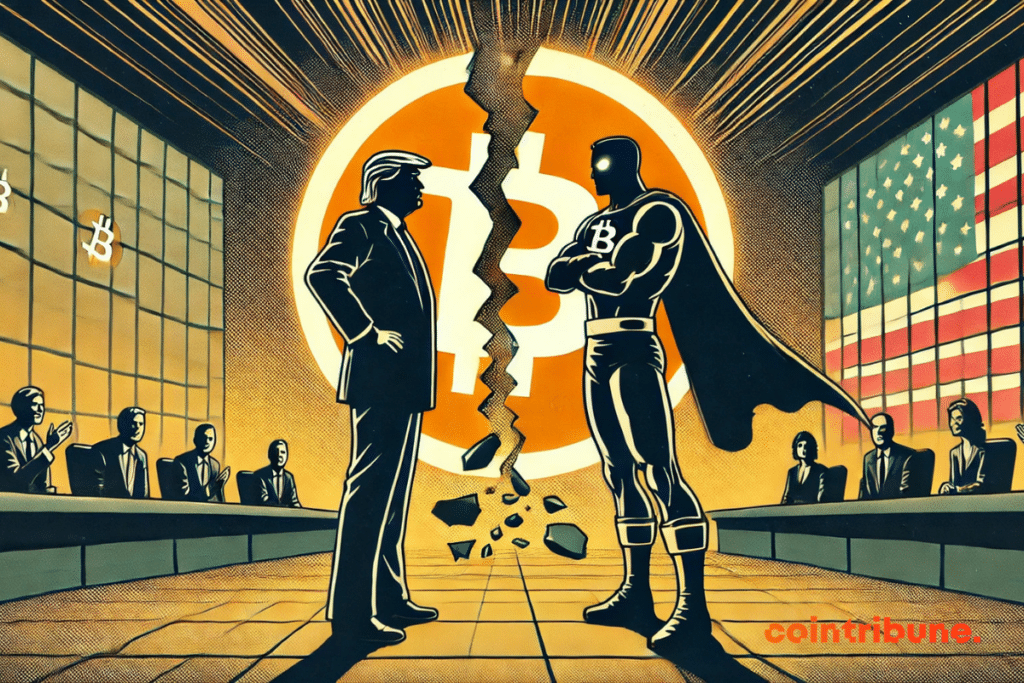Bitcoin Overlooked at the Trump–Bukele Summit: A Strategic Choice Or Oversight?
On April 14th, Donald Trump met with Salvadoran President Nayib Bukele at the White House to discuss immigration, security, and trade between the two nations. A meeting that, while marked by concrete discussions on thorny topics, skipped over a question dear to both leaders: Bitcoin. The timing might have seemed perfect to address this crypto, but, strangely, it was not mentioned. Was it a deliberate choice or simply a timing issue?

The focus of the Trump-Bukele meeting: immigration, security, and trade
During this meeting, bilateral security and immigration took precedence. The United States and El Salvador maintain close ties on these issues. Trump, still concerned about combating illegal immigration, proposed sending American criminals to Salvadoran prisons, in an effort to ease the US prison system while strengthening cooperation between the two countries.
This is part of the famous $6 million agreement signed between the two nations, which includes the deportation of foreign criminals to El Salvador.
In this regard, Trump also suggested expanding prisons in El Salvador to house even more deportees.
Meanwhile, he addressed trade, mentioning the trade war with China. Trump proposed a temporary exemption for American automakers to help them relocate their production. A pragmatic and immediately relevant approach, as the auto industry still finds its footing after disruptions in global supply chains.
I like the Salvadoran people, and they have a pretty president.
This was therefore a meeting marked by serious discussions on domestic policy and international trade, far from the crypto scene. And if Bitcoin was set aside, it was probably because immediate security and diplomatic issues took precedence.
Bitcoin put on hold: a lack of choice?
However, this meeting took place in a context where Bitcoin holds a central place in the agendas of both leaders. El Salvador was the first country to adopt Bitcoin as legal tender in 2021, a bold decision led by Bukele. As for Trump, he also supported this idea in his own way, signing an executive order in March 2024 to create a strategic Bitcoin reserve in the US. The idea was to accumulate Bitcoin seized in criminal cases and to use it to build a national stockpile of the cryptocurrency.
Despite these shared positions on crypto, the discussions on April 14th did not address cryptocurrency at all. A strange silence, especially since Trump has been increasingly positioning himself as an anti-international institutions figure lately. In fact, both men seem to have prioritized more “tangible” topics for now, leaving aside the debate on regulation or worldwide adoption of Bitcoin.
Some will see it as a deliberate strategy to divert attention from crypto issues, or perhaps a way to reorient focus to subjects deemed more “urgent” by their respective administrations. Global economic policy, especially during geopolitical tensions, seems to take precedence over the crypto question, which, although revolutionary, remains an evolving subject.
The meeting between @nayibbukele and @realDonaldTrump marks a turning point in Salvadoran history.
But the lack of discussion about Bitcoin will surely raise questions in the coming months.
The main points of the Trump-Bukele meeting:
- Immigration: Deportations discussed, with plan to send American criminals to El Salvador;
- Security: Proposal to expand prisons in El Salvador to accommodate more foreigners;
- Trade: Temporary exemption for American automakers facing the trade war with China;
- Bilateral relations: Strengthening security and economic ties between the US and El Salvador;
- Bitcoin absence: Despite their support for crypto, no subject about Bitcoin was addressed during the meeting.
El Salvador faces compromises with the IMF: Bitcoin in dotted lines
While Bitcoin remained on the sidelines, another major topic related to El Salvador came into the background: its agreement with the IMF. In December 2022, the country signed a $1.4 billion loan with the International Monetary Fund. An agreement that included strict conditions, notably the need to review its Bitcoin policy and reduce public sector involvement in cryptocurrencies.
This decision marked a turning point for the Salvadoran government, which had until then made Bitcoin a key part of its economic strategy.
Although lawmakers had to modify Bitcoin laws to comply with this agreement with the IMF, the country continues despite everything to make daily Bitcoin purchases. Today, El Salvador holds about 6,000 BTC, worth approximately 520 million dollars.
Bukele thus had to juggle between his ambitions for crypto and the IMF’s requirements, which paved the way for necessary compromises to maintain the country’s economic stability.
Trump, on his side, might ignore this international pressure. He has always been a fierce critic of global institutions like the IMF or the World Bank, and his priorities seem to be more focused on national solutions, such as relocalizing auto production.
This anti-institution stance could also partly explain why he did not address Bitcoin during his meeting with Bukele.
Ultimately, this meeting was not marked by discussions on Bitcoin but rather by immediate geopolitical challenges. Security, immigration, and trade overshadowed crypto, although it remains an essential topic for Trump and Bukele. The future of BTC in the relations between the two countries could depend on forthcoming economic and political developments.
Maximize your Cointribune experience with our "Read to Earn" program! For every article you read, earn points and access exclusive rewards. Sign up now and start earning benefits.
La révolution blockchain et crypto est en marche ! Et le jour où les impacts se feront ressentir sur l’économie la plus vulnérable de ce Monde, contre toute espérance, je dirai que j’y étais pour quelque chose
The views, thoughts, and opinions expressed in this article belong solely to the author, and should not be taken as investment advice. Do your own research before taking any investment decisions.